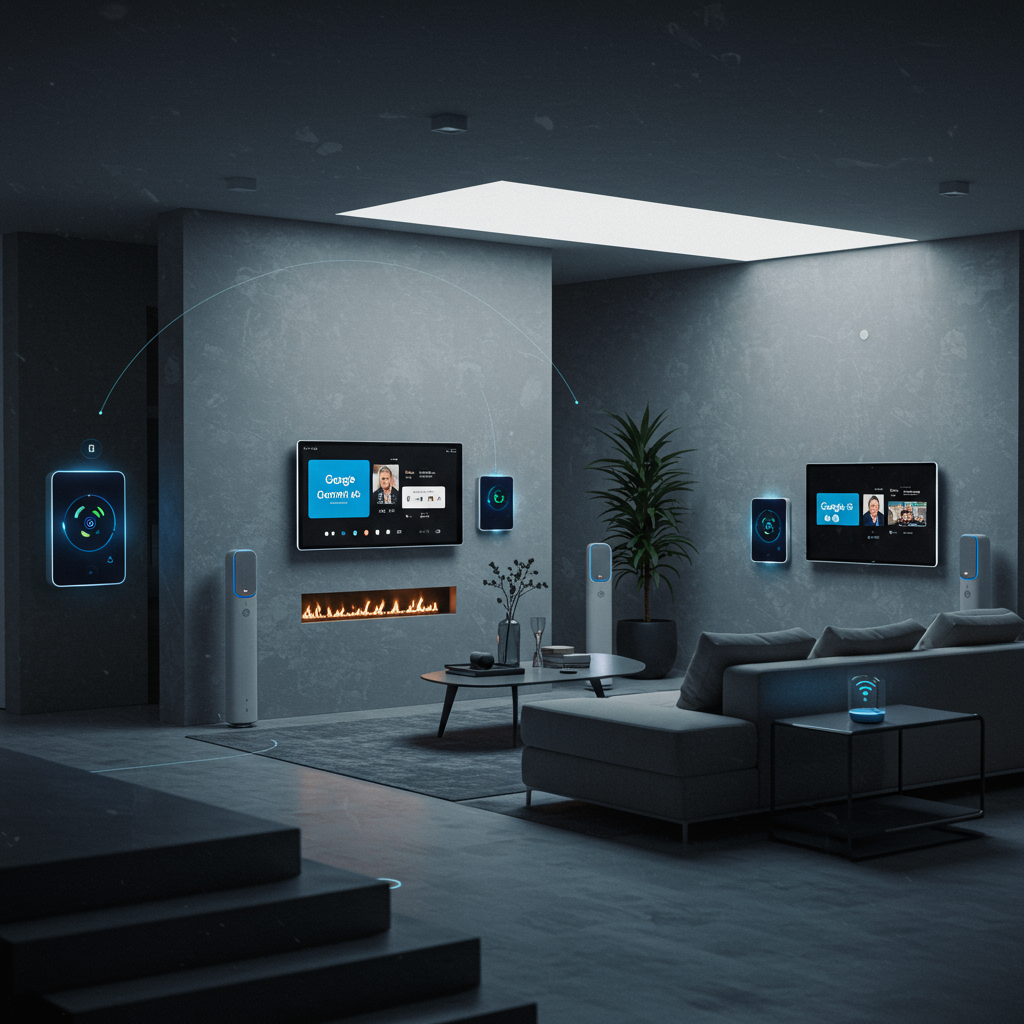Google is ushering in a transformative era for smart home technology with the launch of Gemini for Home. This isn’t just an update; it’s a foundational shift in how artificial intelligence powers our living spaces, replacing the familiar Google Assistant on smart speakers and displays, injecting unprecedented intelligence into cameras, and overhauling the core Google Home app. For millions of users and tens of thousands of developers, October 1, 2025, marks the dawn of a truly intelligent, responsive home experience. Get ready for a seamless blend of natural language interaction and advanced device control, setting a new benchmark for smart living.
The Foundational Shift: Gemini Replaces Google Assistant
The introduction of Gemini for Home signals Google’s strategic pivot towards a more advanced, multimodal AI. This potent new engine is designed to deliver a far more intuitive and conversational interaction than its predecessor, Google Assistant. Users can now engage with their smart home devices using natural, flowing language, freeing them from rigid commands and pre-set phrases. Imagine asking your home for a recipe based on ingredients you have, then effortlessly requesting modifications on the fly – Gemini’s ability to maintain conversational context makes this a reality. This significant upgrade extends to existing devices, including displays, speakers, cameras, and doorbells purchased within the last decade, ensuring broad compatibility and a unified experience.
Empowering Developers: A New Era for Google Home AI
Google’s “Works with Google Home” program has already connected over 800 million devices to its ecosystem through Cloud-to-Cloud APIs and Matter. With Gemini for Home, this vast network gains unprecedented intelligence. Developers are at the forefront of this evolution, poised to leverage enhanced capabilities that will redefine user interaction.
Automatic Conversational Benefits for 800M+ Devices
Perhaps the most exciting aspect for developers is that the core conversational benefits of Gemini for Home will automatically extend to all existing “Works with Google Home” integrated devices. This means users will instantly gain the ability to control devices and create complex automations using more natural language, without requiring any additional development work from partners. This frictionless upgrade enhances the user experience across a massive installed base, fostering greater device engagement.
Crucial Testing for Existing Integrations
While the conversational enhancements are automatic, Google emphasizes the critical need for developers to immediately and robustly test their existing “Works with Google Home” integrations. As Gemini for Home rolls out to users this month, ensuring seamless and reliable performance with these new conversational capabilities is a shared top priority. To support this, Google plans to provide improved data and tools later in the year, helping developers monitor device performance and reliability effectively. This proactive testing ensures that the user experience remains flawless as the ecosystem evolves.
Building the Next-Gen AI Cameras with Gemini for Home
Google is committed to bringing Gemini’s power to everyone, regardless of brand or price point. This commitment is particularly evident in its expansion of the platform with a dedicated program for camera manufacturers, aiming to build the next generation of AI cameras. This initiative takes the “Works with Google Home” promise to an entirely new level, fostering a diverse ecosystem of intelligent security and monitoring solutions.
A Comprehensive Toolkit for Camera Makers
This new program isn’t just a set of guidelines; it’s a complete toolkit designed to help partners build advanced AI cameras. It includes a new hardware reference design, recommending specific System on Chips (SoCs), image sensors, and other components from an approved vendor list (AVL). Complementing the hardware is a new device-side Google Home camera embedded SDK. This powerful SDK, common across both Nest and partner camera devices, provides a best-in-class on-device machine learning (ML) framework. It unifies live view and event history with Google Home’s camera and intelligence cloud, making these new products far more sophisticated than previous “Works With Google Home” cameras, which primarily offered only Live View. This split compute model – on-device ML providing keyframes and metadata to the cloud for features like Gemini AI Descriptions – ensures robust and intelligent video analysis.
Introducing New Nest Cams: 2K HDR & Advanced AI
Alongside the partner program, Google has unveiled a new lineup of Nest Cams and a Doorbell specifically engineered to fully leverage Gemini for Home capabilities. The new Nest Cam Indoor (3rd gen), Nest Cam Outdoor (2nd gen), and Nest Doorbell (3rd gen) are “true AI cameras” designed to provide rich, detailed data for Google’s multimodal AI. These devices boast best-in-class 2K HDR video, Google’s highest resolution, crucial for advanced semantic scene understanding. Independent third-party testing by DXOMARK even ranked them first in their class for image quality. They also feature expanded fields of view (e.g., Nest Cams with 152-degree diagonal view, Nest Doorbell with 1:1 aspect ratio and 166-degree diagonal view) and improved low-light performance, staying in full-color mode longer at dawn and dusk.
These hardware innovations unlock powerful Gemini for Home features. Some, like AI notifications (e.g., “dog jumps out of playpen” with zoomed previews), require a Google Home Premium subscription. Others, such as searching video history with natural language queries via “Ask Home” and “Home Brief” (which summarizes hours of footage), are also premium features. However, out-of-the-box, these Nest cameras offer zoom and crop for live feeds, intelligent alerts (identifying people, vehicles, animals, packages), and doubled event video history (six hours of 10-second clips). Priced between $99.99 and $179.99, these devices prioritize privacy with encrypted video and a visible green LED, and sustainability through recycled materials and plastic-free packaging.
Affordable AI: Walmart’s onn Devices Powered by Google Home
Demonstrating the platform’s commitment to accessibility, Google announced Walmart as its first partner in the camera program. Walmart is launching the new onn Indoor Camera Wired ($22.96) and onn Video Doorbell Wired ($49.86). These affordable devices offer robust performance, including up to 1080p live view resolution and intelligent alerts. Crucially, they integrate seamlessly with the Google Home app and provide access to Gemini for Home’s new camera understanding capabilities, alongside deep integrations into the entire Google Home ecosystem across speakers, smart displays, phones, tablets, watches, TVs, web, and partner apps. A Google Home Premium subscription can further unlock advanced features, intelligent alerts, and event history for these onn devices.
Beyond Cameras: The New Google Home Speaker
The Gemini for Home expansion isn’t limited to visual intelligence. Google is also introducing a new Google Home Speaker, engineered specifically for Gemini for Home. This speaker features custom processing for Gemini’s advanced AI, facilitating faster and more fluid natural conversations. A new, dynamic light ring provides visual feedback, indicating when Gemini is active. It delivers balanced, 360° audio and, in a long-requested feature, allows users to pair two Google Home Speakers with a Google TV Streamer for cinematic surround sound. The speaker also supports existing multi-room music and stereo pairing, and includes a physical microphone mute toggle for privacy. This compact, elegant speaker, sustainably made with recycled materials, will launch in Spring 2026 for $99.99. Gemini for Home will start rolling out to existing speakers and smart displays via an early access program by the end of October.
Gemini for Home: A Broader Industry Trend
Google’s move with Gemini for Home is part of a broader, aggressive push by major tech players to infuse advanced AI into the home. This “ambient intelligence” paradigm aims to shift computer usage away from smartphones toward more intuitive, context-aware devices.
Amazon’s Alexa+ & Ambient Intelligence
Google’s primary competitor, Amazon, recently unveiled its own ambitious vision for an AI-driven future with a comprehensive suite of new and upgraded Kindle, Ring, and Echo devices deeply integrated with its advanced Alexa+ assistant. Showcased on September 30, 2025, Alexa+ is powered by custom AI silicon (AZ3 and AZ3 Pro chips) for proactive, personalized experiences. New Echo devices feature “Omnisense,” leveraging cameras, audio, ultrasound, and Wi-Fi radar to enable Alexa+ to proactively respond to home events. Ring security devices now offer “Alexa Plus Greetings,” “Search Party” for lost pets, “Familiar Faces,” and “Retinal Vision” for improved low-light video, with “Video Descriptions” as a beta feature for premium subscribers. Amazon’s strategy, backed by a reported $105 billion investment in AI in 2025, aims to solidify its dominance in the smart home sector.
Samsung’s Ballie & Google Cloud Partnership
Beyond direct competition, Google Cloud is also expanding partnerships to embed Gemini into other brands. Samsung, for instance, announced an expanded collaboration with Google Cloud to integrate Gemini into its new home AI companion robot, Ballie, set for release in the US and Korea this summer. Ballie, leveraging Gemini’s multimodal capabilities, will process audio, visual, and environmental data to engage in natural, conversational interactions. It aims to offer personalized assistance, from adjusting lighting and greeting visitors to providing fashion advice or health and wellbeing recommendations by grounding Gemini in Google Search. This signifies how generative AI is extending beyond smartphones to dedicated home companion robots.
Navigating the AI Home: Subscriptions and Future
While Gemini for Home promises unprecedented intelligence, many of its advanced features, like detailed AI notifications, video history search with natural language, and footage summaries, will require a monthly subscription, estimated at $20. This trend of premium AI features behind a paywall reflects a growing monetization strategy in the industry, raising questions about “subscription fatigue” among consumers. Google’s vision, however, extends beyond its own devices, aiming for widespread third-party integration of Gemini into other smart home products, transforming the entire ecosystem.
Frequently Asked Questions
What is Gemini for Home, and how does it change the Google Assistant experience?
Gemini for Home is Google’s next-generation artificial intelligence platform designed to replace the existing Google Assistant across smart speakers, displays, and other connected home devices. It introduces a “foundational shift” by enabling more natural, conversational language interactions, allowing users to control devices and create complex automations without rigid commands. Unlike Assistant, Gemini for Home can maintain conversational context, enabling fluid back-and-forth exchanges for tasks like recipe modifications or complex queries. This upgrade significantly enhances the intelligence of smart home cameras and overhauls the Google Home app, offering a more intuitive and responsive user experience.
Which new Google and partner devices support Gemini for Home?
Google is expanding Gemini for Home support across both new first-party hardware and partner devices. New Nest Cams (Indoor 3rd gen, Outdoor 2nd gen) and the Nest Doorbell (3rd gen), launching October 1, 2025, are “true AI cameras” engineered for Gemini, offering features like 2K HDR video and advanced AI notifications. A new Google Home Speaker, launching Spring 2026, is also custom-built for Gemini’s advanced AI. Additionally, Google has partnered with Walmart to launch affordable onn Indoor Camera Wired ($22.96) and onn Video Doorbell Wired ($49.86) devices, which fully integrate with Gemini for Home capabilities and the Google Home ecosystem. Existing “Works with Google Home” devices (over 800 million) will also automatically gain core conversational benefits.
Is a Google Home Premium subscription necessary for Gemini for Home features?
While many core conversational benefits of Gemini for Home will be automatically available for existing devices, some of its most advanced features will require a Google Home Premium subscription, which is estimated to cost $20 monthly. These premium features include detailed AI notifications (e.g., “dog jumps out of playpen”), the ability to search video history using natural language queries (“Ask Home”), and “Home Brief” summaries of recorded footage. Essential functionalities like basic intelligent alerts and enhanced video history will still be available without a subscription on new Nest Cams, and affordable partner devices like Walmart’s onn devices can also unlock advanced features with a Premium subscription.
The Future is Now: Building Helpful, AI-Powered Homes
The launch of Gemini for Home represents a significant milestone in the evolution of smart home technology. It marks Google’s unwavering commitment to creating a truly helpful, AI-powered home where devices work together seamlessly, enhancing daily life through intuitive, conversational interactions. For developers, this expanding platform, coupled with comprehensive toolkits for building the next generation of AI-infused devices, presents a new frontier of opportunity. As the smart home landscape rapidly evolves, Google Home is solidifying its position as the best place to build innovative AI experiences. Join Google in shaping the future of intelligent living, where your home anticipates your needs and responds with unprecedented intelligence.




